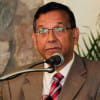Digital security act to be revised

Law Minister Anisul Huq has agreed to sit again with representatives of the Editors' Council, the Association of Television Channel Owners and a faction of Bangladesh Federal Union of Journalists once the parliamentary committee concerned revises the proposed Digital Security Act in the light of discussions at a meeting of the committee yesterday.
At the invitation of the Parliamentary Standing Committee on Post, Telecom and ICT, the representatives of the three organisations had the meeting with the committee and voiced their deep concern over the proposed law.
Emerging from the two-hour meeting at the Jatiya Sangsad Bhaban, the law minister told reporters that he would recommend that the standing committee bring necessary amendments to the proposed law.
The minister also assured of clearing vagueness in different sections of the proposed law, especially in defining the spirit of the 1971 Liberation War, and the actions to be considered as offences of hurting religious sentiment, and causing deterioration in law and order.
Anisul said, “The meeting was very fruitful as all of us have reached a consensus that there will be no law which will contradict the constitution regarding the freedom of the press and the freedom of speech.
“We will not enact any law aiming at journalists or one that will create obstacles to independent journalism.”
Asked, Posts, Telecom and ICT Minister Mustafa Jabbar said, “We came out of the meeting, assuring them [the representatives] that their objections regarding eight sections of the proposed law will be considered.”
At the meeting, the Editors' Council, an organisation of editors of the country's national dailies; the ATCO and the BFUJ faction voiced concern over section 8, 21, 25, 28, 29, 31, 32, and 43 of the proposed law, saying these would greatly hamper the freedom of speech and independent journalism.
They also unanimously said several sections in the proposed law have ambiguity and loopholes which should be addressed. Otherwise, there will be ample scope for its misuse.
During the discussion, journalists' leaders proposed inclusion of media representatives in the Digital Security Council as mentioned in the proposed law, meeting sources said.
They also said it has to be ensured that activities of the Digital Security Agency, as mentioned in the proposed act, do not create obstacles to doing journalism.
Editors' Council President Golam Sarwar, editor of the daily Samakal; General Secretary Mahfuz Anam, editor and publisher of The Daily Star; BFUJ President Monjurul Ahsan Bulbul and Secretary General Omar Faruq; and ATCO President Salman F Rahman and Senior Vice President Mozammel Babu expressed satisfaction over the meeting's outcome.
Imran Ahmed, chairman of the JS body and Awami League lawmaker, chaired the meeting.
The Editors' Council submitted a written proposal to the House body, expressing concern over eight sections -- 8, 21, 25, 28, 29, 31, 32, and 43 of the proposed law.
It said these sections would greatly harm the freedom of speech and independent journalism.
The council also said the definition of the spirit of the Liberation War, and actions to be considered as offences of hurting religious sentiment and causing deterioration in law and order should be specified in the proposed law.
Later, Golam Sarwar told reporters that they urged the standing committee to remove all sections that are obstacles to the freedom of the press.
“We waged a movement to establish democracy. We have told [the committee] that we will also wage a movement to save independent journalism.”
The senior journalist also said they want to make sure that their demands are met before the proposed law is placed in parliament.
Mahfuz Anam told reporters that they pointed out the sections containing elements that may hinder the freedom of the press and create obstacles to independent journalism.
“The committee has taken the observations sincerely. We hope it will consider our concern and bring necessary changes to the proposed law.
“The committee assured us that they will try their best to make the entire law acceptable to journalists.”
BFUJ President Bulbul told reporters that they recommended amending the proposed Digital Security Act to incorporate a provision for forming a cell under Bangladesh Press Council.
There has to be a provision that the proposed law cannot be applied against journalists or media outlets without prior approval from the cell, they mentioned.
“There must be a special arrangement in the proposed law for using any of its provisions against journalists or media outlets. It cannot be used against them instantly.
“There should be a cell at Bangladesh Press Council, which will record complaints. The proposed law can be applied against any journalist or media outlet only upon the cell's approval,” he added.
ATCO President Salman said the parliamentary watchdog assured them that it would take into consideration the issues they raised at the meeting.
The House committee also said it would place the proposed law in parliament after making necessary amendments.
Talking to reporters at his office, committee Chairman Imran said there are some ambiguities in several sections of the proposed law.
“That is why we will have to bring some amendments to the proposed act to clear those ambiguities,” he said, adding that they will discuss these issues at the committee's next meeting after the Eid-ul-Fitr.
On the ambiguity in defining the spirit of the Liberation War, he said they would follow the preamble of the constitution in that case.
About hurting religious sentiment, Imran said the committee might include section 295(A) of the penal code in the proposed law.
He also said the Official Secrets Act might be followed in defining the offences of computer or digital spying as mentioned in Section 32 of the proposed law.
About Section 43 of the proposed law that empowers a police official to conduct search or arrest anyone without any warrant issued by a court, Imran said a special committee could be formed in this regard, and no one would be arrested without the committee' permission.
Members of the parliamentary committee, including State Minister for ICT Zunaid Ahmed Palak, and lawmakers Moazzem Hossain Ratan, Showkat Hasanur Rahman, Kazi Firoz Rashid and Hosne Ara Lutfa Dalia, were present at yesterday's meeting.
Mustafa Jabbar and Anisul Huq attended it at the JS body's invitation.
WHAT SECTIONS 21, 25,
28, 29, 31 and 32 SAY
Section 21 of the proposed law says anyone spreading negative propaganda against the Liberation War or the Father of the Nation, using digital devices or instigates to do so, can be sentenced up to 14 years in jail or fined up to Tk 1 crore or both.
He or she will face up to life sentence or a fine of Tk 3 crore or both for committing the offence for the second time, it said.
Section 25 says a person may face up to three years in jail or Tk 3 lakh in fine or both if he or she is found to have deliberately published or broadcast in a website or electronic form something which is attacking or intimidating or which can make someone dishonest or disgruntled; knowingly publish or broadcast false and distorted (full or partial) information to annoy or humiliate someone; knowingly publish or broadcast false and distorted (full or partial) information to tarnish the image of the state or to spread rumour.
Second-time offenders will face up to five years in jail or a fine of Tk 10 lakh or both, it said.
Section 28 says a person may face up to seven years' imprisonment or Tk 10 lakh in fine or both if he or she is found to have deliberately published or broadcast something in a website or in electronic form or gets it done to hurt one's religious sentiment and values.
A person will face up to 10 years in jail or a fine of Tk 20 lakh or both for committing the offence for the second time, it said.
Section 29 says a person may face up to three years in jail or a fine of Tk 5 lakh or both if he or she commits the offences stipulated in Section 499 of the Penal Code through a website or in electronic form.
He or she will face up to five years in jail or a fine of Tk 10 lakh or both for committing the offence for the second time, it said.
Section 31 says a person may face up to seven years in prison or Tk 5 lakh in fine or both if he or she is found to have deliberately published or broadcast something on a website or in electronic form which can spread hatred and create enmity among different groups and communities, and can cause deterioration in law and order.
Second-time offenders can be punished with up to 10 years' imprisonment or Tk 10 lakh in fine or both, it said.
According to section 32 of the proposed law, a person may face a maximum of 14 years in jail or a fine of Tk 25 lakh or both on the charges of computer or digital spying if he or she illegally enters the offices of the government, semi-government, autonomous or statutory bodies and collects or preserves or sends any top secret or secret documents through a computer, digital device, computer network, digital network or any electronic form or help others to do that.
He or she will face imprisonment up to life term or a fine of Tk 1 crore or both for committing the crimes for the second time.
According to Section 34 of the proposed law, a person may face up to 14 years in jail or Tk 1 crore or both for hacking.

 For all latest news, follow The Daily Star's Google News channel.
For all latest news, follow The Daily Star's Google News channel. 








Comments